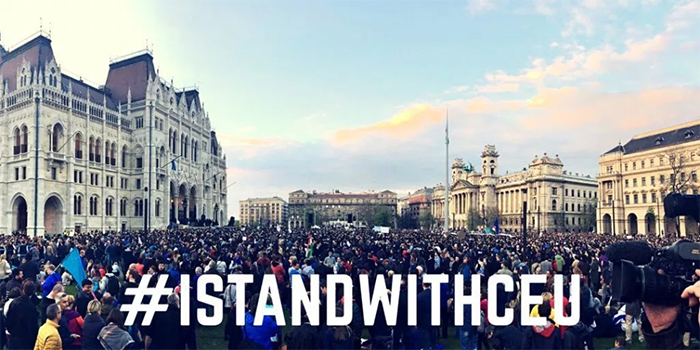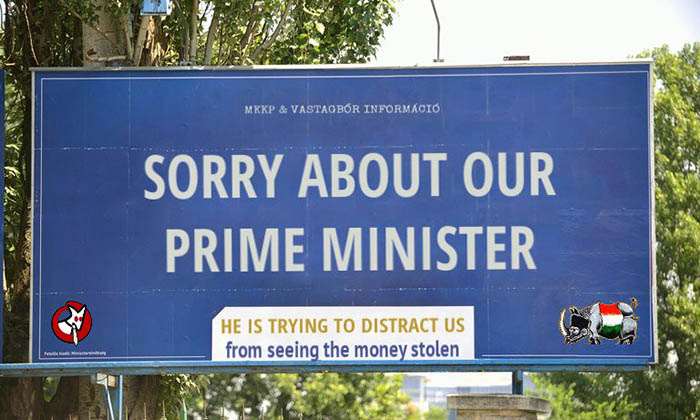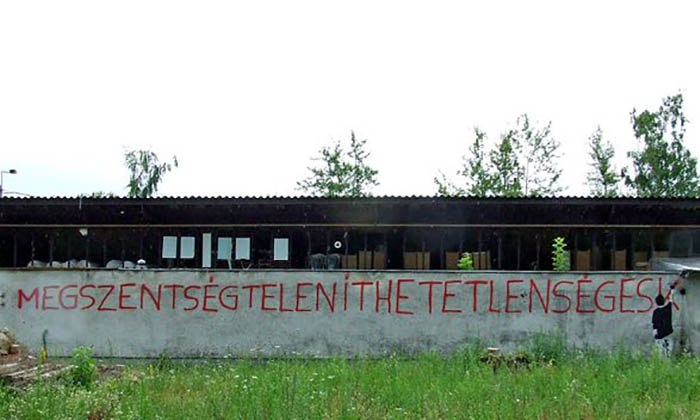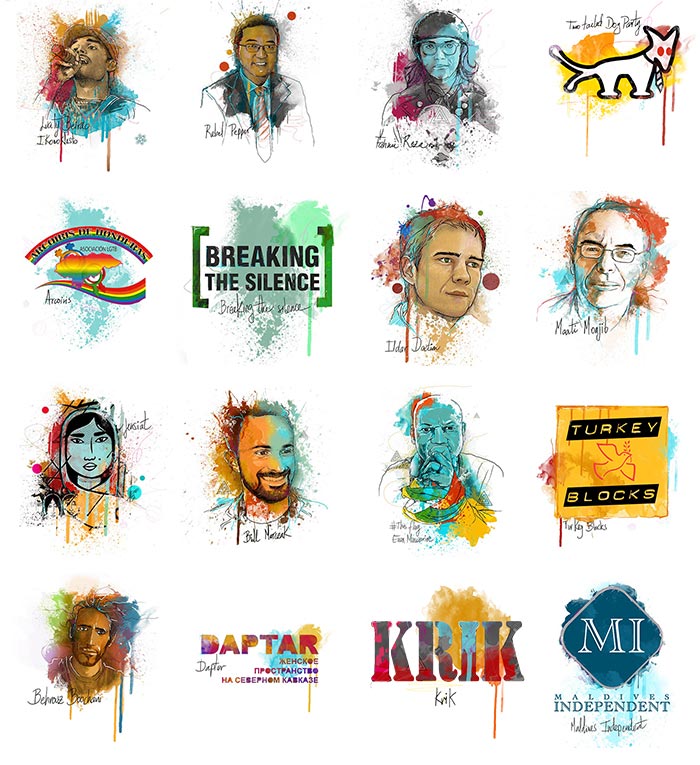Index relies entirely on the support of donors and readers to do its work.
Help us keep amplifying censored voices today.
[vc_row][vc_column][vc_column_text]

Viktor Orban (Credit: European People’s Party)
As Hungary prepares for parliamentary elections, independent journalists have become a target of the pro-government media outlets. This follows a speech by Hungarian prime minister Viktor Orban at the end of July at Tusványos, the annual Fidesz jamboree in Băile Tușnad, Romania, during which he said: “We must stand our ground against the Soros mafia network and bureaucrats in Brussels, and will have to go to battle against the media they operate in the coming months.”
Orban’s message at Tusványos is considered a preview of what to expect from the Hungarian government in the following months. A few days after the speech, Magyar Nemzet daily reported that the prime minister’s words signal a clear change in tactics: instead of defaming independent media outlets and their owners, pro-government media outlets started going after prominent journalists, known for their work of exposing the corruption of the Hungarian government.
During September 2017, pro-government media outlets started publishing articles discrediting leading Hungarian journalists critical to Orban’s regime.
On 5 September 2017, 888.hu published a list of journalists accused of being “mouthpieces” for George Soros, who has been called a “national security risk” and a “public enemy” by Orban for allegedly supporting the mass immigration of Muslims into Europe.
“The international media, with a few exceptions, generally write bad things about the government because a small minority with great media influence does everything to tarnish the reputation of Hungary in front of the world — prestige that has been built over hundreds of years by patriots,” 888.hu wrote.
Among those listed are Lili Bayer, a journalist working for Politico, László Balogh, a Pulitzer-winner photographer, Márton Dunai, Gergely Szakács and Sándor Pető, journalists working for the Reuters news agency, as well as Zoltán Simon, a journalist working for Bloomberg, and ZDF producer István Sinkovicz.
“The article is indicative of the extent to which the pro-government press seems willing to carry out the political orders of prime minister Viktor Orbán,” Budapest Beacon commented, adding that the editor in chief of 888.hu is Gábor G. Fodor, deputy chairman of Századvég Foundation’s board of trustees. Századvég is a think-tank and consultancy that has been embroiled in numerous scandals involving large government orders since 2010. The publisher of 888.hu is Modern Media Group Zrt., a company owned by Árpád Habony, an informal advisor to the prime minister.
The list was condemned by the 3,500-member National Association of Hungarian Journalists (MUOSZ). The body said that there is no evidence of any contact between Soros and the journalists named in the piece. “Stigmatising colleagues by using listing methods that hark back to former anti-democratic times is far from the practice of democratic journalism and informing (the public),” said MUOSZ.
The campaign against journalists continued on 11 September 2017 with a piece on 888.hu attacking Gergely Brückner, one of Hungary’s leading business journalists working at index.hu. The piece accused Brückner of writing an article about the political-diplomatic background of several millions of dollars transferred to Hungary from an Azerbaijani slush fund without any evidence.
“I was not particularly bothered by the editorial, although I don’t think he understands correctly where the trenches in the Hungarian media landscape are,” Gergely Brückner told Index on Censorship. “He also exaggerates my importance (of course, I felt flattered), and for sure he does misunderstand the goals I had with my articles.”
“It is known that the ruling party is always looking for enemies, these being refugees, Soros, the EU, NGOs and independent journalists, all of which are under attack,” Brückner added. “This is how they are trying to keep their core voters engaged.”
Unfortunately, ordinary media consumers have a difficulty in making a distinction between independent, fact-based journalism and biased, post-truth journalism, as Brückner explains. “I am not disturbed at being targeted and it does not influence my work or my sources. They had an obviously exaggerated opinion about me, but they did not have false statements. In the latter case, I would seek legal redress.”
On 14 September 2017, Attila Bátorfy, a data journalist at investigative website Atlatszo.hu and research fellow at CEU’s Center for Media and Communication Studies was also the target of a defamatory article published on an obscure blog, Tűzfalcsoport. The piece, illustrated with a photo of enlarged mites, is claiming that Bátorfy’s piece on the spread of Russian propaganda in Hungary is based on faulty evidence.
A day later, on 15 September 2015, Pesti Srácok, another website close to the government published an article about András Földes, a journalist working for index.hu who reported extensively on the migration crisis. The piece is a list of Földes’s more important reports, along with “ironic” commentary.
“When he goes to war zones, he watchfully takes a peek on the trenches, carefully avoiding danger, then he presents the things he saw as he wishes (…). His extraordinary talent is also shown by the fact that he believes anything to 17-year old immigrant men born on 1 January. At least we hope he naively believes the overstatements he writes about, and these (overstatements) are not invented by him,” the article goes.
Even if the readership of such a blog or website is relatively small, these articles are usually echoed in the media universe loyal to Orban and are often referenced by the public media as well, meaning that the allegations reach a considerable audience.
The recent defamatory pieces are only the tip of the iceberg of the attacks on press freedom in Hungary. Since 2010, the Hungarian government led by Orbán is working systematically to silence critical voices by changing the legal framework regarding media, redrawing the advertising market, introducing preferential taxes that only hit certain, independent broadcasters, buying up media companies, or simply closing them down, as happened with the largest opposition newspaper, Népszabadság.
The most alarming recent incidents regarding press freedom in Hungary:
Police check IDs of TV crew filming new PM office
Journalist assaulted at a Fidesz public forum
Largest opposition daily suspended
Parliamentary amendment restricts access to public information[/vc_column_text][/vc_column][/vc_row][vc_row][vc_column][vc_basic_grid post_type=”post” max_items=”4″ element_width=”6″ grid_id=”vc_gid:1506503807710-1289f6d8-e51b-2″ taxonomies=”2942″][/vc_column][/vc_row]
[vc_row][vc_column][vc_column_text]
As a new law passed by Hungarian prime minister Viktor Orbán’s government threatens the existence of Central European University in Budapest, 70,000 people marched in protest in the capital to save it as part of the #IStandWithCEU campaign.
Among those offering supportto protect the academic freedom of one of central Europe’s most prominent graduate universities, either by writing letters or demonstrating, include more than 20 Nobel Laureates including Mario Vargas Llosa, hundreds of academics worldwide, the European Commission, the UN, the governments of France and Germany, 11 US Senators, Noam Chomsky and Kofi Annan.
Whilst the amendment, which will effectively force CEU to shut, has been signed into statute by Hungarian president Janos Ader, the university hopes to challenge the law in the Hungary’s Constitutional Court.
In a video released on 20 April, Michael Ignatieff, president and rector of CEU, said: “Three weeks ago this university was attacked by a government who tabled legislation that would effectively shut us down. We fought back and the reception around the world has been just magnificent.”
He added: “Academic freedom is one of the values we just can’t compromise.”
Orsolya Lehotai, a masters student at CEU and one of the organisers of the street protest movement Freedom for Education, told Index that initially the small group of students had hoped to “mimic democratic society” and stop the law passing in its original form.
“So far in the seven years of the Orbán government, whenever there was big opposition to something, people have taken to the streets and this has actually changed legislation, so we decided it would show a little power if we were to have people in the streets about this,” Lehotai said. “Back then [at the first protest] we were unsure when the parliamentary debate was to happen but we had had news that it was to happen on a fast-track, which to us was outrageous.”
Despite the protests and international criticism, the Hungarian government said that the law is designed to correct “irregularities” in the way some foreign institutions run campuses. Government officials maintain that the legislation is not politically motivated.
Áron Tábor is a Fulbright scholar and another CEU student who has taken to the streets. He spoke to Index about the absurdity of the Hungarian government’s stance: “This is one university, where the language is instruction is English and the programs run according to the American system.The government says that CEU is a ‘phantom university’, or even a ‘mailbox university’, which doesn’t do any real teaching, but only issues American degrees from a distance. This is a ridiculous claim.”
Gergő Brückner, a journalist at Index.hu described the political paranoia that lies behind the new laws: “One important thing to know is that Fidesz doesn’t like anything that is not part of their own Fidesz system. You can be a famous filmmaker, a university researcher or an Olympic medal winner but you must, for them, be the part of the national circle of Fidesz.”
“If you are an independent and well-funded American university – then you are not controlled, and you can easily be portrayed as a kind of enemy,” he added.
Since its establishment in 1991, CEU has made no secret of its commitment to freedom of expression. It was founded by a group of intellectuals including George Soros, who has been much criticised by Orbán.
The university was designed to reinforce democratic ideals in an area of the world just emerging from communist control. This ethos continues: in February the annual president’s lecture at CEU was given by the University of Oxford academic Timothy Garton Ash who spoke on the topic of “Free Speech and the Defense of an Open Society”.
When the law comes into force, requirements for foreign higher education institutions to have a campus in their home country mean that it will be impossible for CEU to continue operating.
Similarly, requiring a bilateral agreement between the government of the country involved, and the Hungarian government is a huge obstacle, as in CEU’s case this would be the USA but the US federal government has made it clear that it is not within their competence to negotiate this.
More generally, the ability of the Hungarian government to block any agreement raises worrying possibilities, too. Professor Jan Kubik told Index: “A democratic government has no business in the area of education, particularly higher education, except for providing funds for it. When a government tries to play an arbiter, dictating who does and who does not have the right to teach that is a sure sign of authoritarian tendency.”
Kubik, director of University College London’s School of Slavonic and Eastern European Studies, along with over a thousand other international academics, has strongly criticised the new legislation, and his department is holding a rally in London on April 26.
He has also signed an open letter published in the Financial Times.
He said: “Any governmental attempt to close down a university is always very troubling. An attack on a university in a country that has already been travelling on a path towards de-democratisation for a while is alarming.
“Universities are like canaries of freedom and independence of the public sphere. Their death or weakening signals trouble for this sphere, a sphere that is indispensable for democracy.”
With the international condemnation of the Lex CEU amendment and a likely protracted legal battle ahead, what Kubik called “a magnificent institution of higher learning, as devoted to the freedom of intellectual inquiry and high ethical standards as any of the best universities in the world” is not expected to shut its doors this year.
Meanwhile, those fighting for fundamental freedoms in Hungary will continue to challenge Orbán. European Commission vice president Frans Timmermans said, CEU has been a “pearl in the crown” of central Europe that he would “continue to fight for”, and for as long as global opinion remains so loudly behind CEU, Orbán will find it an institution difficult to silence. [/vc_column_text][/vc_column][/vc_row][vc_row][vc_column][vc_basic_grid post_type=”post” max_items=”4″ element_width=”6″ grid_id=”vc_gid:1493126838618-e2c5cf5d-d00a-0″ taxonomies=”2942″][/vc_column][/vc_row]
[vc_row][vc_column][vc_column_text]
Hungary’s high tide of populism was beaten back briefly in October 2016 when prime minister Viktor Orban’s referendum on closing the door on refugees was ruled invalid after just 44% of the population bothered to show up and vote.
The country’s Two-tailed Dog Party don’t take credit for the result, but were certainly part of the mass soft power endeavour that defeated the referendum, and they used a tact rarely seen in Hungarian politics today: humour.
They urged voters to “Vote invalidly!” by answering both yes and no. “A stupid answer to a stupid question.”
What officially became known as the Two-tailed Dog Party in 2006 has been around since 2000, when it was a group of street artists fronted by Gergely Kovács. In their current form they parody political discourse in Hungary with artistic stunts and creative campaigns.
The Two-tailed Dog is a vital alternative voice following the rise of Orban and is now a registered political party ready to contest in 2018’s parliamentary elections. They can no longer be written off as a joke.
When the prime minister started plastering Hungary with anti-immigrant posters with slogans like “If you come to Hungary, you may not take jobs away from Hungarians,” and “If you come to Hungary, you must respect our culture,” the Two-tailed Dog responded with a billboard campaign of their own: “If you are Hungary’s prime minister, you have to obey our laws,”; “Come to Hungary by all means, we’re already working in London.”

The lampooning was largely crowdfunded, and volunteers from around the country were on hand to erect 500 outdoor billboards and over 100,000 smaller posters.
When Orban introduced the national consultation on immigration and terrorism in 2015, as part of a series of xenophobic measures to repel tens of thousands of migrants and refugees, and plastered cities with anti-immigrant billboards, the Two-tailed Dog launched mock questionnaires and even more billboards and posters.
Relentlessly attempting to reinvigorate public debate and draw attention to under-covered taboo topics, the party’s recent efforts also include painting broken pavement to draw attention to a lack of public funding.

“It would be important for people to be able to discuss things again and for the atmosphere in the country to finally improve and change back to normal,” Kovács says.
 [/vc_column_text][/vc_column][/vc_row][vc_row full_width=”stretch_row_content” equal_height=”yes” el_class=”text_white” css=”.vc_custom_1490258749071{background-color: #cb3000 !important;}”][vc_column width=”1/2″][vc_custom_heading text=”Support the Index Fellowship.” font_container=”tag:p|font_size:28|text_align:center” use_theme_fonts=”yes” link=”url:https%3A%2F%2Fwww.indexoncensorship.org%2Fsupport-the-freedom-of-expression-awards%2F|||”][vc_column_text]
[/vc_column_text][/vc_column][/vc_row][vc_row full_width=”stretch_row_content” equal_height=”yes” el_class=”text_white” css=”.vc_custom_1490258749071{background-color: #cb3000 !important;}”][vc_column width=”1/2″][vc_custom_heading text=”Support the Index Fellowship.” font_container=”tag:p|font_size:28|text_align:center” use_theme_fonts=”yes” link=”url:https%3A%2F%2Fwww.indexoncensorship.org%2Fsupport-the-freedom-of-expression-awards%2F|||”][vc_column_text]
By donating to the Freedom of Expression Awards you help us support
individuals and groups at the forefront of tackling censorship.
[/vc_column_text][/vc_column][vc_column width=”1/2″ css=”.vc_custom_1490258649778{background-image: url(https://www.indexoncensorship.org/wp-content/uploads/2016/04/donate-heads-slider.jpg?id=75349) !important;background-position: center !important;background-repeat: no-repeat !important;background-size: cover !important;}”][/vc_column][/vc_row][vc_row][vc_column][vc_basic_grid post_type=”post” max_items=”4″ element_width=”6″ grid_id=”vc_gid:1490271092003-8af6e4a2-7218-9″ taxonomies=”8734″][/vc_column][/vc_row]
 Judges include actor Noma Dumezweni; former Vanity Fair editor Tina Brown
Judges include actor Noma Dumezweni; former Vanity Fair editor Tina BrownA Zimbabwean pastor who was arrested by authorities last week for his #ThisFlag campaign, an Iranian Kurdish journalist covering his life as an interned Australian asylum seeker, one of China’s most notorious political cartoonists, and an imprisoned Russian human rights activist are among those shortlisted for the 2017 Index on Censorship Freedom of Expression Awards.
Drawn from more than 400 crowdsourced nominations, the shortlist celebrates artists, writers, journalists and campaigners overcoming censorship and fighting for freedom of expression against immense obstacles. Many of the 16 shortlisted nominees are regularly targeted by authorities or by criminal and extremist groups for their work: some face regular death threats, others criminal prosecution or exile.
“The creativity and bravery of the shortlist nominees in challenging restrictions on freedom of expression reminds us that a small act — from a picture to a poem — can have a big impact. Our nominees have faced severe penalties for standing up for their beliefs. These awards recognise their courage and commitment to free speech,” said Jodie Ginsberg, CEO of campaigning nonprofit Index on Censorship.
Awards are offered in four categories: arts, campaigning, digital activism and journalism.
Nominees include Pastor Evan Mawarire whose frustration with Zimbabwe’s government led him to the #ThisFlag campaign; Behrouz Boochani, an Iranian Kurdish journalist who documents the life of indefinitely-interned Australian asylum seekers in Papua New Guinea; China’s Wang Liming, better known as Rebel Pepper, a political cartoonist who lampoons the country’s leaders; Ildar Dadin, an imprisoned Russian opposition activist, who became the first person convicted under the country’s public assembly law; Daptar, a Dagestani initiative tackling women’s issues like female genital mutilation that are rarely discussed publicly in the country; and Serbia’s Crime and Corruption Reporting Network (KRIK), which was founded by a group of journalists to combat pervasive corruption and organised crime.
Other nominees include Hungary’s Two-tail Dog Party, a group of satirists who parody the country’s political discourse; Honduran LGBT rights organisation Arcoiris, which has had six activists murdered in the past year for providing support to the LGBT community and lobbying the country’s government; Luaty Beirão, a rapper from Angola, who uses his music to unmask the country’s political corruption; and Maldives Independent, a website involved in revealing endemic corruption at the highest levels in the country despite repeated intimidation.
Judges for this year’s awards, now in its 17th year, are Harry Potter actor Noma Dumezweni, Hillsborough lawyer Caiolfhionn Gallagher, former Vanity Fair editor Tina Brown, designer Anab Jain and music producer Stephen Budd.
Dumezweni, who plays Hermione in the stage play Harry Potter and the Cursed Child, was shortlisted earlier this year for an Evening Standard Theatre Award for Best Actress. Speaking about the importance of the Index Awards she said: “Freedom of expression is essential to help challenge our perception of the world”.
Winners, who will be announced at a gala ceremony in London on 19 April, become Index on Censorship Freedom of Expression Awards Fellows and are given support for their work, including training in areas such as advocacy and communications.
“The GreatFire team works anonymously and independently but after we were awarded a fellowship from Index it felt like we had real world colleagues. Index helped us make improvements to our overall operations, consulted with us on strategy and were always there for us, through the good times and the pain,” Charlie Smith of GreatFire, 2016 Freedom of Expression Awards Digital Activism Fellow.
This year, the Freedom of Expression Awards are being supported by sponsors including SAGE Publishing, Google, Vodafone, media partner CNN, VICE News, Doughty Street Chambers, Psiphon and Gorkana. Illustrations of the nominees were created by Sebastián Bravo Guerrero.
Notes for editors:
For more information, or to arrange interviews with any of those shortlisted, please contact: Sean Gallagher on 0207 963 7262 or [email protected]. More biographical information and illustrations of the nominees are available at indexoncensorship.org/indexawards2017.

Luaty Beirão, Angola
Rapper Luaty Beirão, also known as Ikonoklasta, has been instrumental in showing the world the hidden face of Angolan President José Eduardo dos Santos’s rule. For his activism Beirão has been beaten up, had drugs planted on him and, in June 2015, was arrested alongside 14 other people planning to attend a meeting to discuss a book on non-violent resistance. Since being released in 2016, Beirão has been undeterred attempting to stage concerts that the authorities have refused to license and publishing a book about his captivity entitled “I Was Freer Then”, claiming “I would rather be in jail than in a state of fake freedom where I have to self-censor”.
Rebel Pepper, China
Wang Liming, better known under the pseudonym Rebel Pepper, is one of China’s most notorious political cartoonists. For satirising Chinese Premier Xi Jinping and lampooning the ruling Communist Party, Rebel Pepper has been repeatedly persecuted. In 2014, he was forced to remain in Japan, where he was on holiday, after serious threats against him were posted on government-sanctioned forums. The Chinese state has since disconnected him from his fan base by repeatedly deleting his social media accounts, he alleges his conversations with friends and family are under state surveillance, and self-imposed exile has made him isolated, bringing significant financial struggles. Nonetheless, Rebel Pepper keeps drawing, ferociously criticising the Chinese regime.
Fahmi Reza, Malaysia
On 30 January 2016, Malaysian graphic designer Fahmi Reza posted an image online of Prime Minister Najib Razak in evil clown make-up. From T-shirts to protest placards, and graffiti on streets to a sizeable public sticker campaign, the image and its accompanying anti-sedition law slogan #KitaSemuaPenghasut (“we are all seditious”) rapidly evolved into a powerful symbol of resistance against a government seen as increasingly corrupt and authoritarian. Despite the authorities’ attempts to silence Reza, who was banned from travel and has since been detained and charged on two separate counts under Malaysia’s Communications and Multimedia Act, he has refused to back down.
Two-tailed Dog Party, Hungary
A group of satirists and pranksters who parody political discourse in Hungary with artistic stunts and creative campaigns, the Two-tailed Dog Party have become a vital alternative voice following the rise of the national conservative government led by Viktor Orban. When Orban introduced a national consultation on immigration and terrorism in 2015, and plastered cities with anti-immigrant billboards, the party launched their own mock questionnaires and a popular satirical billboard campaign denouncing the government’s fear-mongering tactics. Relentlessly attempting to reinvigorate public debate and draw attention to under-covered or taboo topics, the party’s efforts include recently painting broken pavement to draw attention to a lack of public funding.
 Arcoiris, Honduras
Arcoiris, Honduras
Established in 2003, LGBT organisation Arcoiris, meaning ‘rainbow’, works on all levels of Honduran society to advance LGBT rights. Honduras has seen an explosion in levels of homophobic violence since a military coup in 2009. Working against this tide, Arcoiris provide support to LGBT victims of violence, run awareness initiatives, promote HIV prevention programmes and directly lobby the Honduran government and police force. From public marches to alternative awards ceremonies, their tactics are diverse and often inventive. Between June 2015 and March 2016, six members of Arcoiris were killed for this work. Many others have faced intimidation, harassment and physical attacks. Some have had to leave the country because of threats they were receiving.
Breaking the Silence, Israel
Breaking the Silence, an Israeli organisation consisting of ex-Israeli military conscripts, aims to collect and share testimonies about the realities of military operations in the Occupied Territories. Since 2004, the group has collected over 1,000 (mainly anonymous) statements from Israelis who have served their military duty in the West Bank and Gaza. For publishing these frank accounts the organisation has repeatedly come under fire from the Israeli government. In 2016 the pressure on the organisation became particularly pointed and personal, with state-sponsored legal challenges, denunciations from the Israeli cabinet, physical attacks on staff members and damages to property. Led by Israeli politicians including the prime minister, and defence minister, there have been persistent attempts to force the organisation to identify a soldier whose anonymous testimony was part of a publication raising suspicions of war crimes in Gaza. Losing the case would set a precedent that would make it almost impossible for Breaking the Silence to operate in the future. The government has also recently enacted a law that would bar the organisation’s widely acclaimed high school education programme.
Ildar Dadin, Russia
A long-term opposition and LGBT rights activist, Ildar Dadin was the first, and remains the only, person to be convicted under Russia’s 2014 public assembly law that prohibits the “repeated violation of the order of organising or holding meetings, rallies, demonstrations, marches or picketing”. Attempting to circumvent this restrictive law, Dadin held a series of one-man pickets against human rights abuses – an enterprise for which he was arrested and sentenced to three years imprisonment in 2015. In November 2016, website Meduza published a letter smuggled to his wife in which Dadin wrote that he was being tortured and abuse was endemic in Russian jails. The letter, a brave move for a serving prisoner, had wide resonance, prompting a reaction from the government and an investigation. Against his will, Dadin was transferred and disappeared within the Russian prison system until a wave of public protest led to his location being revealed in January 2017. Dadin was released on February 26 after a supreme court order.
Maati Monjib, Morocco
A well-known academic who teaches African studies and political history at the University of Rabat since returning from exile, Maati Monjib co-founded Freedom Now, a coalition of Moroccan human rights defenders who seek to promote the rights of Moroccan activists and journalists in a country ranked 131 out of 180 on the Reporters Without Borders Press Freedom Index. His work campaigning for press freedom – including teaching investigative journalism workshops and using of a smartphone app called Story Maker designed to support citizen journalism – has made him a target for the authorities who insist that this work is the exclusive domain of state police. For his persistent efforts, Monjib is currently on trial for “undermining state security” and “receiving foreign funds.”
 Jensiat, Iran
Jensiat, Iran
Despite growing public knowledge of global digital surveillance capabilities and practices, it has often proved hard to attract mainstream public interest in the issue. This continues to be the case in Iran where even with widespread VPN usage, there is little real awareness of digital security threats. With public sexual health awareness equally low, the three people behind Jensiat, an online graphic novel, saw an an opportunity to marry these challenges. Dealing with issues linked to sexuality and cyber security in a way that any Iranian can easily relate to, the webcomic also offers direct access to verified digital security resources. Launched in March 2016, Jensiat has had around 1.2 million unique readers and was rapidly censored by the Iranian government.
Bill Marczak, United States
A schoolboy resident of Bahrain and PhD candidate in computer science at the University of California, Berkeley, Bill Marczak co-founded Bahrain Watch in 2013. Seeking to promote effective, accountable and transparent governance, Bahrain Watch works by launching investigations and running campaigns in direct response to social media posts coming from activists on the front line. In this context, Marczak’s personal research has proved highly effective, often identifying new surveillance technologies and targeting new types of information controls that governments are employing to exert control online, both in Bahrain and across the region. In 2016 Marczak investigated several government attempts to track dissidents and journalists, notably identifying a previously unknown weakness in iPhones that had global ramifications.
#ThisFlag and Evan Mawarire, Zimbabwe
In May 2016, Baptist pastor Evan Mawarire unwittingly began the most important protest movement in Zimbabwe’s recent history when he posted a video of himself draped in the Zimbabwean flag, expressing his frustration at the state of the nation. A subsequent series of YouTube videos and the hashtag Mawarire used, #ThisFlag, went viral, sparking protests and a boycott called by Mawarire, which he estimates was attended by over eight million people. A scale of public protest previously inconceivable, the impact was so strong that private possession of Zimbabwe’s national flag has since been banned. The pastor temporarily left the country following death threats and was arrested in early February as he returned to his homeland.
Turkey Blocks, Turkey
In a country marked by increasing authoritarianism, a strident crackdown on press and social media as well as numerous human rights violations, Turkish-British technologist Alp Toker brought together a small team to investigate internet restrictions. Using Raspberry Pi technology they built an open source tool able to reliably monitor and report both internet shut downs and power blackouts in real time. Using their tool, Turkey Blocks have since broken news of 14 mass-censorship incidents during several politically significant events in 2016. The tool has proved so successful that it has begun to be implemented elsewhere globally.

Behrouz Boochani, Manus Island, Papua New Guinea/Australia (he is an Iranian refugee)
Iranian Kurdish journalist Behrouz Boochani fled the city of Ilam in Iran in May 2013 after the police raided the Kurdish cultural heritage magazine he had co-founded, arresting 11 of his colleagues. He travelled to Australia by boat, intending to claim asylum, but less than a month after arriving he was forcibly relocated to a “refugee processing centre” in Papua New Guinea that had been newly opened. Imprisoned alongside nearly 1000 men who have been ordered to claim asylum in Papua New Guinea or return home, Boochani has been passionately documenting their life in detention ever since. Publicly advertised by the Australian Government as a refugee deterrent, life in the detention centre is harsh. For the first 2 years, Boochani wrote under a pseudonym. Until 2016 he circumvented a ban on mobile phones by trading personal items including his shoes with local residents. And while outside journalists are barred, Boochani has refused to be silent, writing numerous stories via Whatsapp and even shooting a feature film with his phone.
Daptar, Dagestan, Russia
In a Russian republic marked by a clash between the rule of law, the weight of traditions, and the growing influence of Islamic fundamentalism, Daptar, a website run by journalists Zakir Magomedov and Svetlana Anokhina, writes about issues affecting women, which are little reported on by other local media. Meaning “diary”, Daptar seeks to promote debate and in 2016 they ran a landmark story about female genital mutilation in Dagestan, which broke the silence surrounding that practice and began a regional and national conversation about FGM. The small team of journalists, working alongside a volunteer lawyer and psychologist, also tries to provide help to the women they are in touch with.
KRIK, Serbia
Crime and Corruption Reporting Network (KRIK) is a new independent investigative website which was founded by a team of young Serbian journalists intent on exposing organised crime and extortion in their country which is ranked as having widespread corruption by Transparency International. In their first year they have published several high-impact investigations, including forcing Serbia’s prime minister to admit that senior officials had been behind nocturnal demolitions in a Belgrade neighbourhood and revealing meetings between drug barons, the ministry of police and the minister of foreign affairs. KRIK have repeatedly come under attack online and offline for their work –threatened and allegedly under surveillance by state officials, defamed in the pages of local tabloids, and suffering abuse including numerous death threats on social media.
Maldives Independent, Maldives
Website Maldives Independent, which provides news in English, is one of the few remaining independent media outlets in a country that ranks 112 out of 180 countries on the Reporters Without Borders Press Freedom Index. In August 2016 the Maldives passed a law criminalising defamation and empowering the state to impose heavy fines and shut down media outlets for “defamatory” content. In September, Maldives Independent’s office was violently attacked and later raided by the police, after the release of an Al Jazeera documentary exposing government corruption that contained interviews with editor Zaheena Rasheed, who had to flee for her safety. Despite the pressure, the outlet continues to hold the government to account.